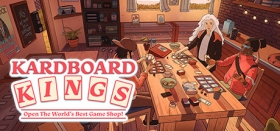
Kardboard Kings: Card Shop Simulator Review
I love card games like Magic: The Gathering, Yu-Gi-Oh, and Pokémon. They’ve provided so many hours of joy for me and many other players across the world. However, cards can be surprisingly expensive like the infamous Black Lotus, which could sell for upwards of £400,000. Maybe it’s because it’s good in the current state of the game, or it's for an ever-growing collection. Either way, if you’re lucky enough, you might have a card that is worth a couple thousand lying around.
So why not open up a card shop to take advantage of that market?

In Kardboard Kings, you do exactly that. After inheriting your late father’s rundown card shop, it's up to you to become the biggest seller of cards in town and hunt down some extremely rare cards for your own collection. However, there has been a recent ring of thefts going around, where the Legendary Cards have been stolen from private collections. You might want to be looking out for them; who knows where they'll turn up?
The story is nothing special. The characters aren’t all that great and the writing won’t win awards. It’s not even that sort of campy fun you’ll find in games that don’t really focus on the story, or something as overdramatic as the Yu-Gi-Oh anime. It’s also really short, ending in about three hours; I thought it would take at least one in-game year, but I reached the credits by the first few days of the second month. It won’t detract from the experience, but you’re better off just skipping through the dialogue while occasionally stopping to read any tutorials, and check the cards the characters mention and their prices. I do appreciate that the game is set in Australia though — Not enough games are set there, despite all the jokes about how dangerous it is.
Your main source of income is from cards, which can be sold, bought, or traded with your regulars. Prices of these cards fluctuate every day, depending on the condition of the card and events that happen outside your shop. Maybe a card is coming off the banlist or a church is calling a certain set satanic, so even a damaged card can be sold for a nice profit. However, you’ll need to keep your store stocked up on cards, as running out of cards or money will force you to close the store. In order for cards to be sold, they’ll need to be put up on display. The game doesn’t pause so you’ll constantly have to go into your collection and put cards up while dealing with all the customers that come in, especially when rush hours come by to speed everything up. This is especially important as you'll have to deal with them more often as your reputation improves.

You can tag cards up on display, which gives those cards certain effects. They can attract more customers, guarantee that it’s bought before the day is over, or increase its price at the cost of reputation (and vice versa). You can only get tags from completing tasks like buying enough decorations or obtaining a certain number of cards, so you’ll need to use them a little wisely.
However, a card shop doesn’t just sell cards. You can draft packs, organise tournaments, and hold clearance sales; they do need to be planned in advance, but you can benefit from organising these events. Whenever a new set comes out you can draft card packs to obtain these new cards in bulk at a fraction of the price, which is great for getting a set started. Tournaments not only give you a chance to improve your reputation but also increase the price of cards in two sets. Finally, holding clearance sales will allow you to improve your reputation while also getting rid of low-priced cards quickly.
Overall, I really liked managing the shop, constantly checking the current prices of cards and buying whatever I could get, even risking getting ripped off by buying card packs for a chance to find a rare. It’s always a good feeling pulling an Elemental Hero Stavros (that is not a misspelling)! I did wish that I could’ve played the card game using the cards I was collecting. Even if it was just a slightly more complicated version of War, it would’ve added a lot to the game.

As for technical aspects, I didn’t suffer major issues. However, the game would occasionally glitch when I was getting new cards from the mail and stop me from taking the card, preventing me from continuing, but a quick restart fixed it. Other than that, the game runs extremely smoothly.
In summary, I liked the game. It won’t appear in Top 10 lists of 2022 games, and there isn’t much to do other than collecting cards once the story is finished, but the simple gameplay loop of waking up, stocking your shelves, and waiting for customers and your newly bought cards to come is surprisingly engaging. If you can get it on sale, you won't be disappointed by what fun the game provides, even if you don’t get to play the Warlock card game that the game revolves around.
Kardboard Kings: Card Shop Simulator (Reviewed on Windows)
This game is good, with a few negatives.
Kardboard Kings is a surprisingly active business management simulator that kept me entertained throughout my time with the game. However, it ends too early and there isn’t much to do afterwards other than collecting cards.








COMMENTS